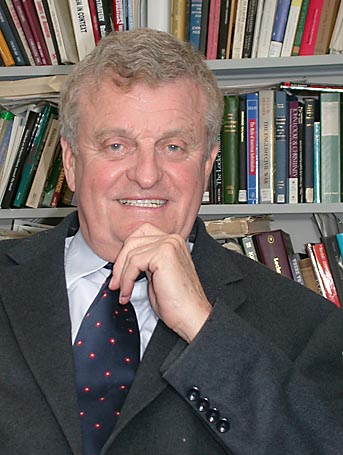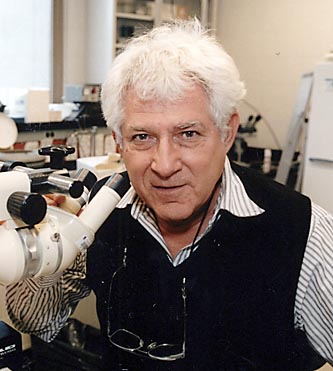Eight faculty members transfer to emeritus status
Princeton NJ -- Eight faculty members were transferred to emeritus status in recent action by the Board of Trustees.
They are: Frediano Bracco, professor of mechanical and aerospace engineering; Michael Danielson, the B.C. Forbes Professor of Public Affairs and professor of politics and public affairs; Nell Painter, the Edwards Professor of American History; Robert Phinney, professor of geosciences; Howard Rosenthal, the Williams Straus Professor of Social Sciences and professor of politics; Paul Sigmund, professor of politics; Malcolm Steinberg, the Henry Osborn Professor of Biology; and Julian Wolpert, the Henry Bryant Professor of Geography, Public Affairs and Urban Planning. All are effective July 1, 2005, except for Wolpert’s, which is effective Sept. 1, 2005.

Bracco
Bracco arrived at Princeton in 1966 as a graduate student. After completing his Ph.D. in 1970, he spent three years as a member of the professional research staff of the Department of Mechanical and Aerospace Engineering before becoming an assistant professor in 1973. He received master’s degrees from the University of Bologna in Italy and the University of Oklahoma.
Bracco’s major work focused on the internal combustion engine. He has published widely on various topics in the field, writing or co-writing more than 200 papers. His research was supported by the U.S. Department of Energy, the Army Research Office and a large number of industrial organizations, including General Motors, John Deere & Co., Nissan and Yamaha.
During his career, Bracco received numerous awards for his contributions to the Society of Automotive Engineers, including the Colwell Merit Award in 1984 and 1985 and the A.T. Horning Award in 1986 and 1987. He was elected a fellow of the society in 1988.

Danielson
Danielson joined the politics department in 1963 after earning his Ph.D. from Princeton. He received a bachelor’s degree and a master’s degree from Rutgers University. Danielson’s field of study is urban policy and planning, with a particular interest in the politics of economic development in urban areas, both domestically and internationally. His 1976 book “The Politics of Exclusion,” one of the most frequently cited books in urban affairs, set the stage for analysis of the growing distinctions between cities and suburbs.
He is the author of 11 books, including “Home Team: Professional Sports and the American Metropolis” and “Profit and Politics in Paradise: The Development of Hilton Head Island.” He also has written about growth in modern Turkey, regional development in New York and urban transportation.
Over the years, Danielson has devoted many hours to University service. He has been associate dean of the Woodrow Wilson School, chair of the politics department and faculty chair of the Wilson School’s undergraduate program. He also has served as director of the Center of Domestic and Comparative Policy Studies, the Center for New Jersey Affairs and the Wilson School’s graduate program.

Painter
Painter has taught at Princeton since 1988. After earning her bachelor’s degree at the University of California-Berkeley, she received a master’s degree from the University of California-Los Angeles and a Ph.D. from Harvard University. Before arriving at Princeton, she was a professor at the University of Pennsylvania and the University of North Carolina-Chapel Hill.
Painter has focused her scholarship on the effects of gender, class and race on American history and on the ways in which people of all colors navigate barriers. Her early books focused on the history of the South. Her subsequent scholarship includes “Standing at Armageddon: The United States, 1877-1919,” a history of the United States from the end of Reconstruction to the upheavals after World War I, and “Sojourner Truth, A Life, A Symbol,” in which Painter explored how visual images of Sojourner Truth articulated abolitionist and early feminist messages.
Painter directed the Program in African American Studies from 1997 to 2000. She has received many awards, including fellowships from the Guggenheim Foundation and the National Endowment for the Humanities. In 2003 Yale University awarded her an honorary doctorate. In 2006 she will be president of the Southern Historical Association and in 2007 president of the Organization of American Historians.

Phinney
Phinney came to Princeton in 1963 after receiving a bachelor’s degree and a master’s degree from the Massachusetts Institute of Technology and a Ph.D. from the California Institute of Technology. He played a pivotal role in the transformation of Princeton’s classical geology department into a modern, interdisciplinary Department of Geosciences. He served as department chair from 1981 to 1987.
His primary research interest has been the mathematics of elastic wave propagation and the application of seismology to the study of the structure and geological evolution of the Earth’s interior. He is one of a handful of academics who transformed seismology from a data-poor, pencil, paper and slide-rule enterprise into the data-rich and computationally demanding field that it is today. Recently his research has focused on the Sierra Nevada Mountains in California.
Phinney has participated in studies of lunar and planetary science conducted by the National Research Council. He was chair of the Lunar Sample Review Board, which evaluated proposals to NASA for the scientific study of returned lunar samples. From 1989 to 1991 he served as president of the Incorporated Research Institutions for Seismology, a consortium of 100 universities responsible for the deployment and maintenance of hundreds of high-fidelity, digital seismic stations.
Rosenthal (photo not available) joined the Princeton faculty in 1993. After earning a bachelor’s degree and a Ph.D. from the Massachusetts Institute of Technology, he was a professor at Carnegie-Mellon University from 1966 to 1993.
His research has explored voting and coalition theory, the political economy of finance, taxation and public goods, and American and European politics. His 1997 book “Congress: A Political-Economic History of Roll Call Voting,” written with Keith Poole, shed light on the development of political parties, the changing nature of politically salient disagreements and the nature of political polarization. Rosenthal also is the author of “Partisan Politics, Divided Government and the Economy” and a co-author of “Income Redistribution and the Realignment of American Politics.”

Sigmund
Rosenthal is a fellow of the American Academy of Arts and Sciences. He has been awarded fellowships from the Guggenheim Foundation, the Center for Advanced Study in the Behavioral Sciences and the Russell Sage Foundation. In 1985 he received the C.Q. Press Award from the American Political Science Association.
Sigmund has been at Princeton since 1963. He previously taught for four years at Harvard University, where he received his Ph.D. His bachelor’s degree is from Georgetown University.
Sigmund’s scholarship has focused on political theory and comparative politics. He has written, edited or translated 18 books, most recently “The Selected Political Writings of John Locke,” published this year. He has written extensively on Latin America, focusing on income inequality, multinationals and the military. Two volumes that have received wide acclaim are “The Overthrow of Allende and the Politics of Chile, 1974-1976” and “The United States and Democracy in Chile.” He also edited “Religious Freedom and Evangelization in Latin America.”
Sigmund helped found the Program in Latin American Studies and was its director for seven years. He has served on the boards of Georgetown University and the Carnegie Council on Ethics and International Affairs, and has been an active member of the Council on Foreign Relations. In 2001 he was the first American academic to receive the Bernardo O’Higgins Order of Merit, awarded by the Chilean government for outstanding accomplishment.

Steinberg
Steinberg came to Princeton in 1966. He received a bachelor’s degree from Amherst College and a Ph.D. from the University of Minnesota. He was a professor at Johns Hopkins University from 1958 to 1966.
The author of more than 150 scientific papers, Steinberg formulated a groundbreaking theory that explained how cells take up their characteristic positions in the young embryo. His papers have been published in Science, the Proceedings of the National Academy of Sciences and Developmental Biology.
Steinberg is a fellow of the American Association for the Advancement of Science. He also has served as a trustee of the Society for Developmental Biology and the Marine Biology Laboratory at Woods Hole; as president of the developmental biology division of the American Society of Zoologists; and as a member of the board on biology of the National Academy of Sciences/National Research Council.

Wolpert
Wolpert has been a member of the Princeton faculty since 1973. A graduate of Columbia University, he received his Ph.D. from the University of Wisconsin. Wolpert previously was a faculty member at the University of Pennsylvania for 10 years.
After teaching in Princeton’s School of Architecture for four years, Wolpert moved to the Wilson School, where he brought a geographic perspective to urban issues. He has written on topics such as location theory, the provision and delivery of public and nonprofit services, urban development and environmental policy. His 1994 book “Patterns of Generosity in America: Who’s Holding the Safety Net?” examined the relationship between private support for the needy through charitable giving and public support through governmental programs. He also is the author of “What Charity Can and Cannot Do,” released in 1995, and a number of recently published monographs on New York City’s nonprofit sector.
Wolpert served as director of the Wilson School’s undergraduate program, Ph.D. program and graduate program as well as director of the Program in Urban and Regional Planning. He was elected to the National Academy of Sciences and the American Association for the Advancement of Science. He also was president of the Association of American Geographers and vice president of the American Geographic Society. He was a fellow at the Guggenheim and Russell Sage foundations, the Woodrow Wilson Center and the Center for Advanced Study in the Behavioral Sciences.







